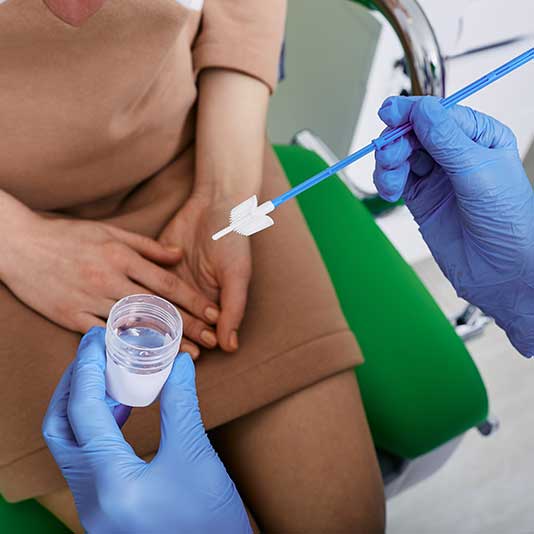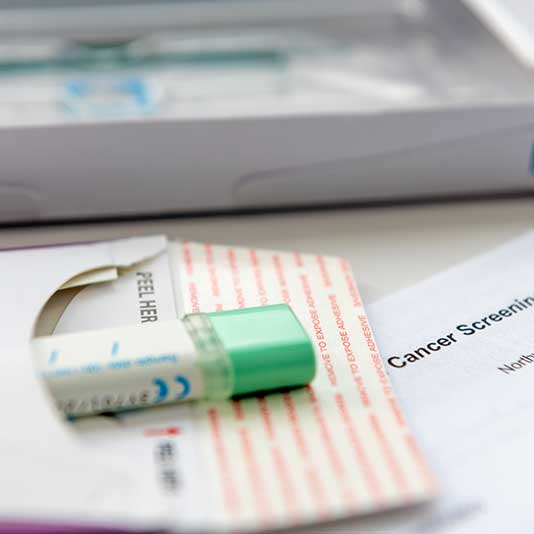Screenings and symptom awareness
Regular check-ups and screenings are key to a woman’s health. Screenings are vital for monitoring our health and detecting abnormalities, conditions and diseases early, often before noticeable symptoms occur.
The NHS offers a range of screening tests to different sections of the population. In this article, we’ll explore the female lifetime screening pathway.
Our former Women’s Health campaign partners, the Lady Garden Foundation, also share the symptoms of the four gynaecological cancers to be aware of. Together, we believe that wider awareness of these symptoms is the key to prevention and early diagnosis, which can save lives.
If you have any of the symptoms listed, particularly if they are not normal for you, are persistent, are reoccurring episodes or they do not go away, please consult a GP.
Simplyhealth’s 24/7 video GP service can provide the first step to discussing your symptoms and providing a referral if needed. You’re also able to upload photos or medical reports from past healthcare to share the GP ahead of your appointment to aid their understanding and inform their treatment suggestions.
Take a look at our screening guide
Download our guide to women’s health screening by age, and see which check-ups are recommended over the course of a women’s lifetime.
Cervical screening
The NHS cervical screening programme offers testing to women between the ages of 25 and 64. Screenings past the age of 64 are offered if one of the previous three tests was abnormal.
Cervical screenings don’t detect cancer; they prevent it by checking a sample of cells from your cervix for the Human Papilloma Virus (HPV). HPV is a common virus that in many cases will go away by itself without causing problems. However, some types can cause cell changes that may develop into cancer if untreated. Around 3,200 women are diagnosed with cervical cancer in the UK each year.1
It’s therefore vital to attend your screenings. If high risk HPV is detected early, you can be monitored for abnormal cell changes. And abnormal changes can be treated, meaning there is much less chance of them turning into cervical cancer.
Cervical cancer symptoms to look out for2:
Bleeding from the vagina at times other than when you are having a period (between periods, after or during sex, at any time if you are past your menopause)
Vaginal discharge that is foul smelling
Discomfort or pain during sex.

Breast screening
Women in the UK are invited for breast screening between the ages of 50 and 53. Further screenings can then be requested by the individual every three years until the age of 71. Screening is performed using a mammogram, a type of x-ray that detects breast cancers when they're too small to see or feel.
Breast symptoms to look out for3:
A new lump or thickening in your breast or armpit
Swelling in your armpit or around your collarbone
Change in size, shape or feel of your breast
Skin changes in the breast such as puckering, dimpling, a rash, crusting around the nipple or surrounding area, or redness of the skin
Fluid leaking from the nipple in a woman who isn’t pregnant or breastfeeding
Changes in the position or direction of the nipple
Nipple inversion.

Bowel cancer screening
At approximately 60 years of age, men and women in the UK are offered bowel screening. You are sent a home test kit, known as a FITT kit which is used to take a stool sample. The sample is checked for blood, which could be an early sign of bowel cancer. Further kits can then be requested by the individual every two years until the age of 75.
Bowel symptoms to look out for4:
Rectal bleeding or blood in your stools
Any changes in your regular bowel movement
A rectal lump that your doctor can feel in your bottom or abdomen, more commonly on the right side
A feeling of needing to strain your rectum (either during going to the toilet or after)
Losing weight
Pain in your abdomen or rectum
Tiredness and breathlessness.
Sometimes cancer can block the bowel. This is called a bowel obstruction. The symptoms include:
Cramping pains in the abdomen
Feeling bloated
Constipation and being unable to pass wind
Being sick.

Symptoms of the four gynaecological cancers
The following conditions are not routinely screened for, so it’s even more important to be aware of their symptoms.
1. Ovarian cancer symptoms
Around 21 cases of ovarian cancer are diagnosed in the UK every day.5 Symptoms may be very vague but can include6:
Feeling bloated (having a swollen tummy)
Loss of appetite and / or feeling full quickly
Pain or discomfort in the lower tummy area and / or back
Needing to pass urine more frequently or urgently
Changes in bowel habits
Constipation
Weight gain or weight loss
Unexplained or extreme tiredness.
2. Vaginal cancer symptoms
Accounting for less than 1% of all cancers diagnosed in the UK7, vaginal cancer is rare, but it is just as vital to be aware of the most common symptoms8.
Blood-stained vaginal discharge
Bleeding and / or pain after sexual intercourse
Needing to pass urine more frequently, in the night and / or blood in the urine
Rectal pain
Continual and persistent vaginal itch
Lump or growth in the vagina that you or your GP can feel.
3. Vulva cancer symptoms
Vulva cancer is more common in older women. It is another rare cancer that can be diagnosed and treated early, or prevented, with further awareness of its symptoms9.
A lasting itch, pain or soreness and thickened, raised, red, white or dark patches on the skin of the vulva
Open sore or growth visible on the skin
Burning pain when you pass urine
Vaginal discharge or bleeding
A mole on the vulva that changes shape or colour
Lump or swelling in the vulva.
4. Womb cancer symptoms
Womb cancer10, sometimes also known as uterine or endometrial cancer, is the fourth most common cancer in women in the UK.11
Abnormal bleeding from the vagina is the most common symptom. Irregular bleeding can be after the menopause, bleeding that is unusually heavy or happens between periods or abnormal coloured vaginal discharge that is foul smelling.
Other symptoms vary depending on stage of diagnosis but can include:
Pain or discomfort in the lower abdomen
Pain during sexual intercourse
Your womb is enlarged and feels swollen although this will be something which your doctor will be able to see
Loss of appetite and weight
Fatigue and / or weakness
Feeling nauseous or being sick
Constipation
Feeling breathless
Passing urine more often than usual.
How Simplyhealth can help
Whilst our health plans don’t offer screenings, our 24/7 online GP service can provide the first step in discussing your symptoms and providing a referral if needed. Access is quick and easy through our SimplyPlan app. 99% of customers are offered an appointment to talk to a GP within three hours.12
With some of our plans, you can also access a discount on general Health Assessments through Nuffield Health.
We also have a 24/7 counselling service if you’re struggling to cope with symptoms or feeling overwhelmed. A qualified professional is waiting at the end of the phone to offer immediate practical information and emotional support.
References
2 https://www.ladygardenfoundation.com/cervical-cancer
3 https://www.cancerresearchuk.org/about-cancer/breast-cancer/symptoms and https://coppafeel.org/your-boobs/
4 https://www.cancerresearchuk.org/about-cancer/bowel-cancer/symptoms
5 https://www.ladygardenfoundation.com/ovarian-cancer
7 https://www.ladygardenfoundation.com/vaginal-cancer
9 https://www.ladygardenfoundation.com/vulva-cancer
10 https://www.ladygardenfoundation.com/womb-cancer
11 https://www.cancerresearchuk.org/about-cancer/womb-cancer
12 Jan- Sept 2021 Square Health Analytical report.